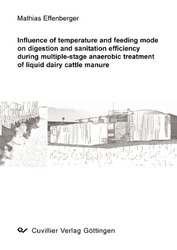| Fachbereiche | |
|---|---|
| Buchreihen (97) |
1381
|
| Nachhaltigkeit |
3
|
| Gesundheitswesen |
1
|
| Geisteswissenschaften |
2370
|
| Naturwissenschaften |
5407
|
| Mathematik | 228 |
| Informatik | 319 |
| Physik | 980 |
| Chemie | 1364 |
| Geowissenschaften | 131 |
| Humanmedizin | 243 |
| Zahn-, Mund- und Kieferheilkunde | 10 |
| Veterinärmedizin | 108 |
| Pharmazie | 147 |
| Biologie | 835 |
| Biochemie, Molekularbiologie, Gentechnologie | 121 |
| Biophysik | 25 |
| Ernährungs- und Haushaltswissenschaften | 45 |
| Land- und Agrarwissenschaften | 1005 |
| Forstwissenschaften | 201 |
| Gartenbauwissenschaft | 20 |
| Umweltforschung, Ökologie und Landespflege | 148 |
| Ingenieurwissenschaften |
1798
|
| Allgemein |
98
|
|
Leitlinien Unfallchirurgie
5. Auflage bestellen |
|
Erweiterte Suche
Influence of temperature and feeding mode on digestion and sanitation efficiency during multiple-stage anaerobic treatment of liquid dairy cattle manure
Mathias Effenberger (Autor)Vorschau
Inhaltsverzeichnis, Datei (34 KB)
Leseprobe, Datei (71 KB)
This work deals with the evaluation of the performance of a multiple-stage anaerobic digestion process with respect to the degradation of organic matter and the inactivation of pathogenic and indicator organisms in liquid dairy cattle manure. Investigations were performed at bench- and full-scale.
During the three-stage mesophilic-thermophilic-mesophilic anaerobic treatment of liquid manure from cattle receiving a high-fiber diet, a comparably high methane yield of 0.24 m3 per kg of volatile solids was achieved. Given a minimum guaranteed retention time of 4 h at 55°C, the level of fecal coliforms in liquid manure was reduced to below 10 MPN per g fresh matter. The concentration of infectious oocysts of Cryptosporidium parvum was reduced by more than 5 log-units. Increasing the feeding interval from 1 to 4 h had no significant influence on the performance of the system. When the temperature in the first treatment stage was decreased from 38 to 20-25°C, the process stability in the thermophilic reactor was significantly improved while overall the methane yield and the reduction of indicator organisms remained essentially unchanged.
Based on these findings, two-stage thermophilic-mesophilic anaerobic digestion can be approved as a treatment technology for liquid manure to minimize the input of pathogenic and indicator organisms from livestock farming into the environment.
| ISBN-13 (Printausgabe) | 3867276528 |
| ISBN-13 (Printausgabe) | 9783867276528 |
| ISBN-13 (E-Book) | 9783736926523 |
| Buchendformat | A5 |
| Sprache | Englisch |
| Seitenanzahl | 144 |
| Umschlagkaschierung | glänzend |
| Auflage | 1 |
| Band | 0 |
| Erscheinungsort | Göttingen |
| Promotionsort | München |
| Erscheinungsdatum | 25.07.2008 |
| Allgemeine Einordnung | Dissertation |
| Fachbereiche |
Land- und Agrarwissenschaften
|
| Schlagwörter | Anaerobe Behandlung; Biogas; Gülle; Milchvieh; Krankheitserreger; Indikatororganismen; mesophil; thermophil; Kryptosporidien |








